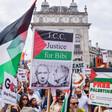From the Editors 25 May 2011
The progressive magazine In These Times blogs today on last night’s event featuring The Electronic Intifada’s Ali Abunimah and celebrated Palestinian spoken-word artist Remi Kanazi at DePaul University — which student activist Sami Kishawi described as “ground zero of the growing campus boycott movement in Chicago” in an op-ed for The Electronic Intifada today.
In These Times contrasted the stale political maneuvering at the annual AIPAC policy conference in Washington with the “mor palpable movement for peace and justice occurring” — the boycott, divestment and sanctions movement to hold Israel accountable for its violations of Palaestinian rights:
DePaul has gained international attention recently through a Boycott, Divestment and Sanctions (BDS) campaign led by Students for Justice in Palestine (SJP) to remove Sabra Hummus from the campus. The campaign targets Sabra specifically because it is owned by the Strauss Group, an organization which has supported the Golani and Givani brigades in Israel which have been accused of multiple human rights violations. SJP was able to bring the issue to a referendum vote which, while it failed to garner enough votes to pass, did come very close; 80% of those who voted did so in support of the boycott. Abunumah and Kanazi both pointed to this as a victory for the movement, in that it gained media attention around the world and in doing so drew attention to the Israeli occupation of Palestine and Israel’s history of war crimes. Other recent BDS victories, including the cultural boycott of Israel by artists such as Elvis Costello, Gil Scott-Heron and The Pixies, serve the same purpose of delegitimatizing the Israeli occupation.
In These Times added:
Abunumah argues that this is the takeaway from a week of speechifying: Israel will continue to recklessly support the status quo and the US will continue to support them in every way with no accountability. But in the end this support will mean very little, because the movement for justice has already inflamed much of the rest of the world, and campaigns like the one at DePaul prove that the movement is growing in the US as well. It will take much more than a high-five speech to Congress on the part of Israel’s Prime Minister to reverse this isolation; it will take substantive steps toward achieving peace.





